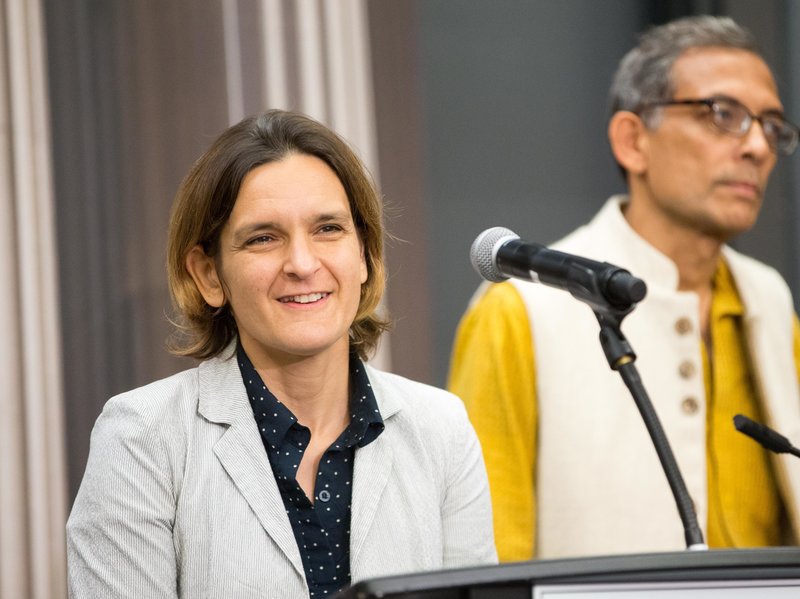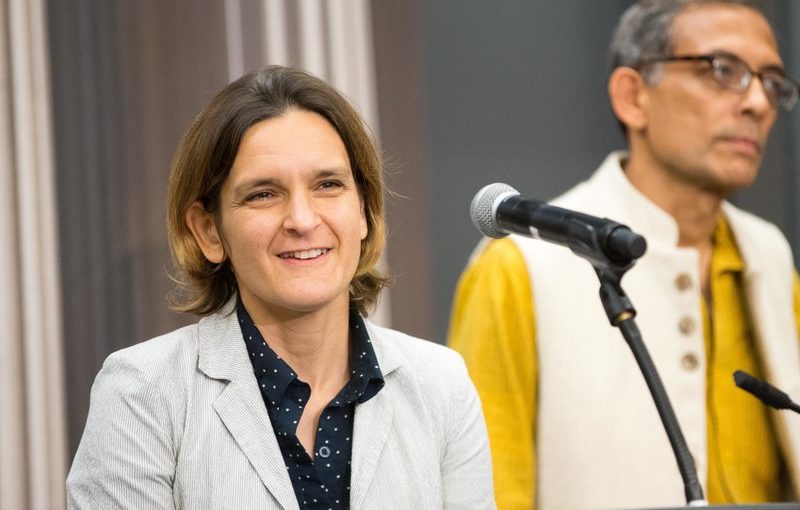By Krishantha Muniappan VI
On April 21st, Roxbury Latin gathered for its third-ever virtual Hall with Nobel-prize-winning economist Dr. Esther Duflo, to conclude a series that has been focused on homelessness and poverty around the globe. This year, RL has already heard from four other prominent speakers experienced with this theme. The first was Matt Desmond, author of Evicted. The second, Tina Batista, is the director of A Bed for Every Child. The third was Kate Walsh, the CEO of the Boston Medical Center and the fourth, Bill Walczak, the co-founder of the Codman Health Center. Each told their separate stories in an engaging manner meant to educate and inspire their audience. As one might expect, the Nobel prize winner had no trouble meeting this standard with a riveting presentation of her own entitled “Fighting Poverty, with Facts and Passion.”

After briefly describing her personal journey into the field of economics to start her presentation, Dr. Duflo introduced one of the Hall’s more significant points, which concerned two generally misguided preconceptions about the poor. With the help of a rather distinctive scene from Tintin, she informed us of the first, which was that the poor are lazy. The second was that the poor are very entrepreneurial, and so they do not need our help. Dr. Duflo believes that these “quick myths about the poor people” have mainly been used as an excuse for why not to help the poor. To conclude this section of the hall Dr. Duflo said, “If there’s one thing I want you to take out of the presentation today, it’s to always try and avoid those prejudices” because “like you… [the poor] are full individuals with dreams, capabilities, and intelligence.”
After comparing two new strategies with a control group, J-Pal discovered that a system called Teaching at the Right Level had succeeded in improving the village school systems and has been able to administer in other developing countries.
Dr. Duflo then went on to describe the work of her organization, the Jameel Poverty Action Lab, or J-Pal for short. She described for us the processes that J-Pal goes through when solving poverty-related issues, beginning with a step that all RL students are familiar with, research. However, the research done by J-Pal is not the same as the research done for an RL essay, as it requires the use of randomized control trials or RCTs. These experiments are commonly used to compare the results of different drugs, therapies, and in the case of J-Pal, poverty alleviation strategies. To construct these progressive plans, J-Pal has partnered with countless local NGOs who have helped to solidify relationships with different countries and counties. After research projects have been completed, J-Pal then shares results with policymakers who have the ability to scale up J-Pal projects. The research project that Dr. Duflo shared with us focused on the restructuring of school systems in Indian villages. After comparing two new strategies with a control group, J-Pal discovered that a system called Teaching at the Right Level had succeeded in improving the village school systems and has been able to administer in other developing countries. Although Dr. Duflo shared a positive result of J-Pal’s research, she also acknowledged the many challenges of implementing the research results. After hearing from economist Dr. Esther Duflo, RL has learned of both the existing preconceptions about the poor as well as the scientific and structured processes used by J-Pal to combat poverty. For more about J-Pal, visit their website, and if you’re interested, here is a link to Dr. Duflo’s Nobel prize speech.
![]()

